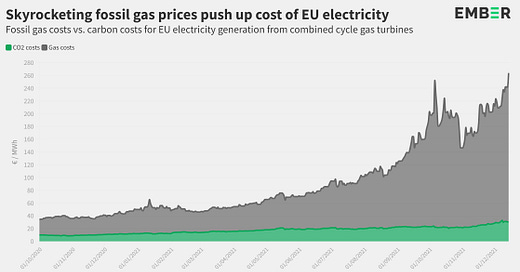Europe's steel industry yet to feel the full force of the carbon market
Critics of the EU carbon market contend that Europe’s policymakers are fools for indulging in such virtue signalling at a time when society, especially the poorest, are hurting under intense inflationary pressures.
Regular readers will know that revenue from auctioned EU carbon allowances (EUAs) can be redirected by member states to support low-income households. In addition, the longer that decarbonisation is delayed, the higher the overall cost to society, adding to future inflationary pressures felt by all.
Nevertheless, one of the frequent criticisms is that high carbon prices are responsible for the increase in energy costs seen over the past couple of years. However, data shows that carbon only accounts for around 10-15% of the increase in the cost of electricity. The massive hike in natural gas prices over the same period the dominant factor driving higher power prices.
Given it involves a highly energy intensive production process, another recent criticism of the EU carbon market is that it is also causing inflationary pressures in the steel market.
Higher steel prices are an additional cost for consumers of cars, household appliances and other products of course, but they also present an additional burden for governments wanting to build out the infrastructure required to decarbonise our economy - whether that is wind turbines or low emission maritime transport, for example.
So is it true that the steel market has been supported by high carbon prices, and if not, when will the impact be felt?




